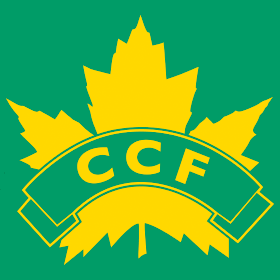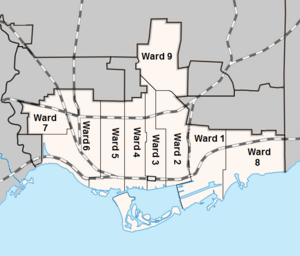The Board of Control of Toronto, Ontario, Canada, was a part of its municipal government until it was abolished in 1969. It served as the executive committee of the Toronto City Council, consisting of four "controllers" elected citywide and presided over by the Mayor. Beginning in 1904, the Board of Control was directly elected by the city's electorate. Each voter could vote for up to four candidates, and the four with the most votes were elected. By tradition the controller who received the most votes would get the powerful budget chief position.
Municipal elections were held in Toronto, Ontario, Canada, on December 6, 1954. Incumbent mayor Leslie Saunders was defeated by Nathan Phillips in a close contest.
Municipal elections were held in Toronto, Ontario, Canada, on December 7, 1953. Incumbent mayor Allan Lamport won an unexpectedly close race against school board trustee Arthur Young. This election was the first for councils in the municipality of Metropolitan Toronto which would be created on January 1, 1954 and was composed of 14 municipalities: the City of Toronto, the towns of New Toronto, Mimico, Weston and Leaside; the villages of Long Branch, Swansea and Forest Hill, and the townships of Etobicoke, York, North York, East York, and Scarborough.
Municipal elections were held in Toronto, Ontario, Canada, on January 2, 1950. This was the last time election were held in January, as a ballot measure passed changing the election date to the first Monday in December. This attempt to increase turnout went into effect immediately and an election was held December 4, 1950. The central issue of the campaign was whether to legalize sport on Sundays, with Controller Allan Lamport the main proponent. A referendum was held on the subject, and it passed by a slim margin.
Municipal elections were held in Toronto, Ontario, Canada, on January 1, 1948. Robert Hood Saunders was re-elected as mayor in an election that also saw no changes on the Board of Control or City Council.
Municipal elections were held in Toronto, Ontario, Canada, on January 1, 1947. With little serious opposition Robert Hood Saunders was re-elected as mayor.
Municipal elections were held in Toronto, Ontario, Canada, on January 1, 1946. Incumbent Robert Hood Saunders was acclaimed as mayor.
Municipal elections were held in Toronto, Ontario, Canada, on January 1, 1945. Controller Robert Hood Saunders defeated incumbent Frederick J. Conboy to be elected mayor.
Municipal elections were held in Toronto, Ontario, Canada, on January 1, 1944. Incumbent Frederick J. Conboy defeated Controller Lewis Duncan. The election was a notable defeat for the Co-operative Commonwealth Federation as it lost all representation on city council.
Municipal elections were held in Toronto, Ontario, Canada, on January 1, 1942. Incumbent Frederick J. Conboy was acclaimed as mayor.
Municipal elections were held in Toronto, Ontario, Canada, on January 1, 1941. Frederick J. Conboy was elected mayor.
Municipal elections were held in Toronto, Ontario, Canada, on January 1, 1940. Incumbent Ralph Day was re-elected mayor. The election saw little change with all incumbent councillors and Board of Control members being reelected.
Municipal elections were held in Toronto, Ontario, Canada, on January 2, 1939. Incumbent Ralph Day was re-elected mayor over former lawyer Lewis Duncan.
Municipal elections were held in Toronto, Ontario, Canada, on December 6, 1937. Ralph Day was elected mayor defeating incumbent William D. Robbins.
Municipal elections were held in Toronto, Ontario, Canada, on December 7, 1936, after being moved up from the traditional New Year's Day vote. William D. Robbins was easily elected mayor to his first full term in office.
Municipal elections were held in Toronto, Ontario, Canada, on January 1, 1936. Sam McBride was elected mayor in a three-way race in which incumbent James Simpson finished third.
Municipal elections were held in Toronto, Ontario, Canada, on January 1, 1935. James Simpson won a surprise victory in the mayoral campaign to become the first socialist candidate elected to the office.
Municipal elections were held in Toronto, Ontario, Canada, on January 1, 1923. Charles A. Maguire was reelected to his second term as mayor.
Municipal elections were held in Toronto, Ontario, Canada, on January 1, 1921. Mayor Tommy Church was elected to an unprecedented seventh consecutive term in office.
Municipal elections were held in Toronto, Ontario, Canada, on January 1, 1914. H.C. Hocken was reelected mayor defeating Fred McBrien. The election was also notable for the victory of Louis Singer, the first representative of Toronto's large Jewish community elected to city council.


